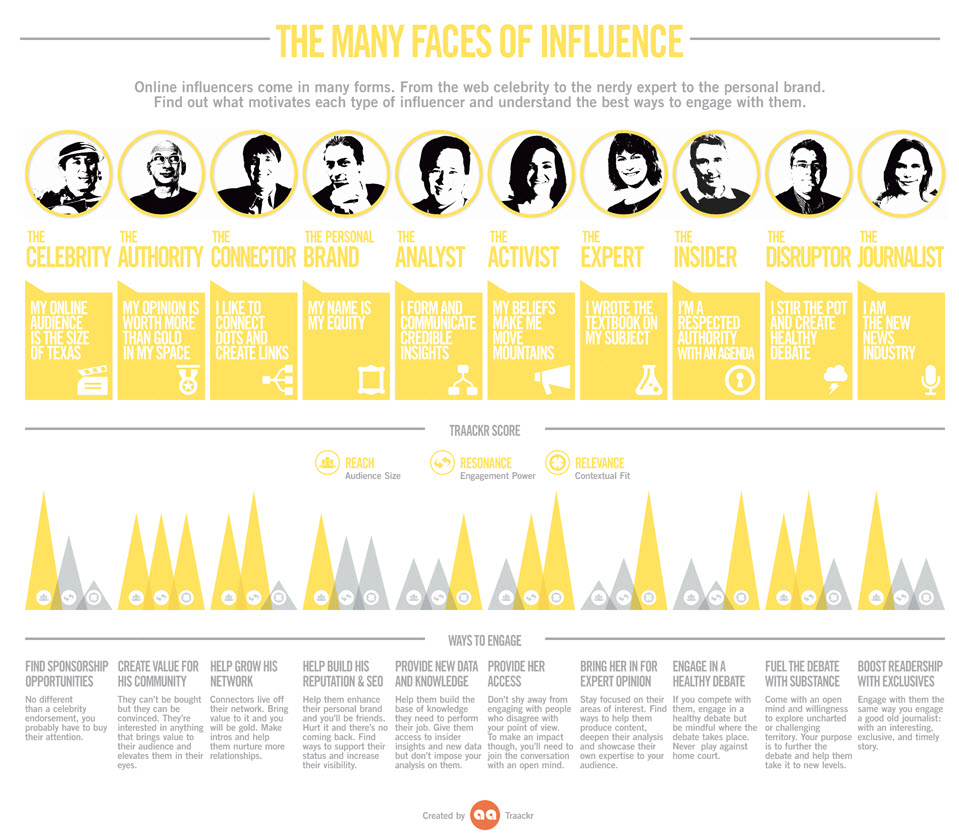I found this interesting infographic about different types of influencers. Here are my thoughts on several of "the Faces" that I often deal with as an influence consultant. Which face are you?
The Celebrity
The Celebrity carries some positive and negative weight. Many attempt to use a celebrity's influence to increase sales. However, this is the most finicky and weakest influencer as there is little substance to back up the endorsement.
Typically the Celebrity influencer is only using a product or service because he/she is being compensated. In today’s social savvy world, the public knows this and often disregards the endorsement.
Another concern is that public opinion of celebrities can turn on a dime. I heard a humorous story where a competitor to Gucci actually mailed Snooki of the MTV show Jersey Shore a free Gucci purse precisely so she would carry it around and damage the Gucci brand. Another Jersey Shore character was paid a monthly stipend by Abercrombie and Fitch to NOT wear their clothes anymore.
Celebrities carry a high reach with a vast amount of followers. However, their resonance is mid-level and context is even lower. Think of all the actors commenting on politics. They usually have no more experience in this realm than you or me. At times, a celebrity can supersede this by gaining deeper experience in an arena. Bono, the U2 singer, is an example of this with his various campaigns to alleviate AIDS.
In the business world, being a celebrity influencer isn’t typically attainable by effort alone, sustainable, nor does it carry enough gravitas to bring about lasting change.
The Authority
At the other end of the spectrum from the Celebrity is the Authority. Seth Godin comes to mind. These men and women are recognized as having vast wisdom about a limited scope. While they aren’t as close to the field of study as the Expert, they are able to amplify the message more effectively. (For an example contrast, think of the Expert as the lab researcher, deep in the bowels of the lab, and the Authority as the study reviewer and publisher, making the findings known to the world while still holding deep knowledge in the subject matter.)
Because of this, they are like E.F. Hutton (if you remember the 1980's commercials). When they speak, people listen AND take action based upon their influence.
Relevance and context are highest for this influencer. Once you are established as an authority, it is maintainable as long as you don’t make massive errors in your recommendations.
The Connector
The Connector is able to see links between people and links between opportunities that may seem disparate to the rest of us.
One friend said a connector is like someone who can gather wild mustangs. They live off their networks.
Connectors make great influences as long as they know what they don’t know. When they try to act as experts like the Authority, they quickly reveal that while they are good at connecting, they don’t have the subject knowledge depth to influence as an authority and can lose credibility.
If you are a connector, do exactly that . . . CONNECT people to people and opportunities to opportunities.
The Expert
The Expert often differs from the Authority in one of two ways.
- They haven’t yet developed a following large enough as they are new to the game of public relations.
- They either lack the skills or don’t care to grow their audience. At times, experts are so subject matter oriented that they don’t "do people" well. (Again, a picture of a researcher deep in the recesses of the lab comes to mind.)
They don’t have the audience that the Authority has and are known in a much tighter sphere. Experts sometimes need a mediating interlocutor to help communicate his or her expertise in a way that is accessible to the masses.
They make great influencers in an advisory role more than a "lead the charge" role. If you have an expert at hand, listen to them. If you are an expert, find a place where you can share your expertise to shape the future.
The Disruptor
Two words . . . Donald Trump.
Disruptors shake things up, describing and bringing problems to light. They don’t always create nuts and bolts solutions to those problems. The can arouse passions and dissatisfaction. Often, their role is to influence others to create real world solutions to change the status quo.
Disruptors can at times be so passionate about creating change that they can become abrasive (again, see Donald Trump). They need people around them to help them stay relatable and to shape their tone.
What Are the Overarching Lessons of The Faces of Influence?
It is important to know your tendency type. Be who you are. If you are a disruptor, don’t focus on becoming the Celebrity. Keep disrupting. If you are an expert, you can try to build your audience, but don’t do so at the expense of losing knowledge trying to gain opportunities in your area of expertise.
Most importantly, know your blind spots. Each type of influencer has a major area where they don’t operate well naturally. Surround yourself with a team to shore up these blind spots. Ensure they have your best interests at heart, and then listen intently to them.
Combine the knowledge of your Influence Type with a deeper understanding of your individual influence traits to expand your influence. The Keller Influence Indicator® is a research-backed assessment, pioneered a Clemson University, providing influencers a dynamic benchmark of current influence abilities and recommended insights to improve. The KII® offers you a score on each of the Seven Traits™.
We offer a free-trial of the KII or view a sample report to see how this beneficial tool can grow your influence.





